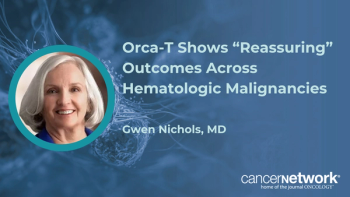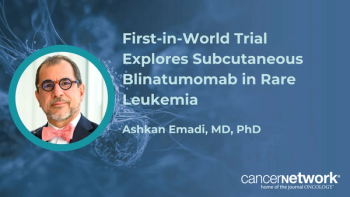
Naval Daver, MD, Provides Perspective on Updates in Acute Myeloid Leukemia
Naval Daver, MD, explains the progress made on 3 abstracts he’s involved with regarding acute myeloid leukemia (AML) at the ASH Annual Meeting and Exposition.
Naval Daver, MD, from The University of Texas MD Anderson Cancer Center in Houston, discussed a number of studies regarding acute myeloid leukemia (AML) treatments presented at the 61st American Society of Hematology (ASH) Annual Meeting & Exposition, held December 7-10, in Orlando, Florida.
Transcription:
On a phase II study with azacytidine (Vidaza) and nivolumab (Opdivo)
So, the study has been completed and has 70 patients on it in the relapsed setting with azacytidine and nivolumab. The overall response rate we see is about 35% for (complete response) and marrow clearance. We see an additional 10%-11% of patients who have very interesting and unique stable disease, where the disease never achieved remission, but they had more than 6 months with improvement in transfusion, outpatient, improved quality of life, which of course is very well known to be occurring with immune checkpoint therapy in solid tumors. So, we think in general about 40%-45% of patients had clinical benefit beyond what we would see in general with AML therapies.
On a phase I study of milademetan in combination with quizartinib
That was the preclinical rationale. We in fact saw mouse survivals that were maintained at more than 100 days, which is almost unheard of in acute myeloid leukemia relapse studies. So, we think that the preclinical synergy could be very, very, very exciting, and that has led to this phase I study.
On a phase Ib trial of venetoclax (Venclexta) in combination with idasanutlin
This data was actually published in a very high impact journal Cancer Cell. What we found was that, when we inhibited MDM2, this seemed to synergize nicely with venetoclax BCL2 inhibition by 2 independent pathways. One was that MDM2 inhibition inhibited the MAP kinase pathway, and this promoted the degradation of MCL1. MCL1 is the most important resistance protein to venetoclax so this was nice, and it would allow venetoclax to work longer or have responses in those who would have otherwise escaped. Also, the inhibition of MDM2 up regulated independently pro apoptotic pathways BAX, BAD, BIM, and these further stabilize MCL1.
Newsletter
Stay up to date on recent advances in the multidisciplinary approach to cancer.













































